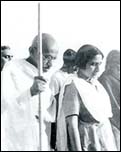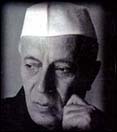'Going to teach in India meant a chance to be involved in what seemed then, and still
does fifty years later, the most fascinating event in twentieth
century history'
Both as an academic and an official with the US government Professor Ainslie T Embree remained a close observer of India for nearly 50 years. He served as the counsellor for cultural affairs at the American embassy in Delhi and special consultant to Ambassador Frank Wisner. From the insights gained during his tenure and exposure to India, Professor Embree believes that Indo US relations have reached a sound footing.
 When Edward Thompson, the historian and novelist, who had worked
in India for many years as an educator, was planning to go back
to England, he wrote to Mahatma Gandhi that he was leaving India.
Gandhi wrote back: "You should know better. You will never
leave India." Gandhi meant, of course, that he would take
India with him. Many of us have found it to be so, that India
is what Nirad Chaudhuri called it, the Continent of Circe,
capturing and holding those who come under her spell.
When Edward Thompson, the historian and novelist, who had worked
in India for many years as an educator, was planning to go back
to England, he wrote to Mahatma Gandhi that he was leaving India.
Gandhi wrote back: "You should know better. You will never
leave India." Gandhi meant, of course, that he would take
India with him. Many of us have found it to be so, that India
is what Nirad Chaudhuri called it, the Continent of Circe,
capturing and holding those who come under her spell.
I think Indians themselves do not always understand why foreigners,
who have no ties of culture and family, feel this way about India.
I got hooked on India fifty one years
ago -- and have stayed hooked through all the intervening tumultuous
years.
My formal connection began shortly after World War II, after service
in the Royal Canadian Air Force with the RAF. I was looking for
something interesting to do, and a friend who had served as a
missionary in India told me that the Indore Christian College
in Central India, which had been founded by the Canadian Church,
was looking for someone to teach European history.
As more than a parenthesis, another reason for deciding to go
was that I had met a young woman who, prior to this, had accepted
a teaching position at the American school in Madurai. Suzanne
was to share my career, and shape her own, in the next fifty years
of India. My students now often ask me why I went to India, and
I think they are disappointed when they learn that my passage
to India was prompted by such mundane reasons, and not some quest
for the wisdom of India.
There were no courses on India when I went to school in Nova Scotia,
Canada, sixty years ago, only some odd, faint, imperial memories.
My college was called Dalhousie, after the grandfather of the
governor-general, and Inglis Street, near the college, commemorated
General Inglis, the hero of the defence of Lucknow, who had been
born there.
But for a young idealist in Canada, as elsewhere at the time,
India meant, in a way that is hard to recapture now, Gandhi and
Nehru. They stood for a new world order, a better future for humankind,
and not just for India, a tryst with destiny. Going to teach in
India meant a chance to be involved in what seemed then, and still
does fifty years later, the most fascinating event in twentieth
century history: the transformation of an imperial possession,
with surpassingly rich historical experience, into a modern, independent
nation.
From 1948 to 1958, we were on the staff of Indore Christian College,
then affiliated with Agra University, Suzanne teaching sociology,
in one of the first programs in that field in India, while I taught
British and European history. It was then that began serious reading
in Indian history under the kindly guidance of mentors at the
local colleges. They were crowded years.
On the personal level, our two children had the advantage of being
born in India and beginning their schooling there, although perhaps
it was not good for our son to be addressed throughout the city
as chhota sahib. The college boys delighted
in teaching him a rich vocabulary of Hindi obscenities, which
he used at all inappropriate times.
 Those years were filled with discussion of the events that I now
teach to students as 'history'; Hyderabad; Kashmir -- if
only it could have been settled as easily as the Hyderabad issue
was; the making of the Constitution, with the most memorable arguments
having to do with the national language and the place of religion;
the Five Year Plans, symbol of so many hopes; Hindi-Chini bhai-bhai;
foreign aid; anti-Americanism (which I enjoyed, being still a
Canadian).
Those years were filled with discussion of the events that I now
teach to students as 'history'; Hyderabad; Kashmir -- if
only it could have been settled as easily as the Hyderabad issue
was; the making of the Constitution, with the most memorable arguments
having to do with the national language and the place of religion;
the Five Year Plans, symbol of so many hopes; Hindi-Chini bhai-bhai;
foreign aid; anti-Americanism (which I enjoyed, being still a
Canadian).
Missing from this list is much memory, even in 1948, of the impact
in Central India of the terrible events of Partition, although
Delhi was only 300 miles away. Then as now, perhaps one of the
great strengths of India is her ability to localise and contain
violence.
Courtesy: New India Digest
|

